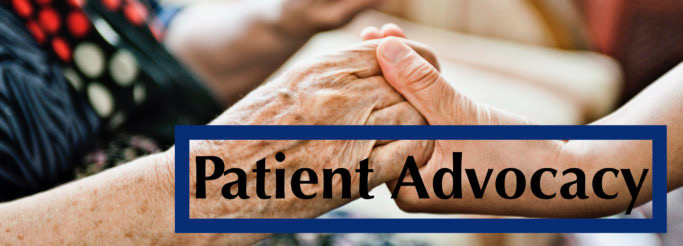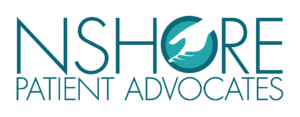Patient Advocacy
This is an exciting week for us, as we are about to co-host the first International Conference on Patient Advocacy (ICOPA) 2019 this coming Thursday, October 3rd through Saturday, October 5th. Right here in Northfield, Illinois! We are proud to offer excellent speakers and panelists presenting and discussing various topics on all things Patient Advocacy.

In honor of our upcoming Conference, and because so many people still don’t know what a Patient Advocate is or does, I will share some basics here with you, in this week’s blog post.
To visualize what we do, we have been referred to as a mix between a respectful lawyer and a pitbull when advocating on behalf of our clients! That’s a compliment and just shows how much we love what we do. And when it comes to interacting with our clients, we are your in-home nurse (while we don’t provide medical care, we observe your medical needs), your friend, your confidant; we give you the compassionate care that you need and deserve. Overall, we are team players, who focus on and strategize for the greatest possible outcome!
What is Patient Advocacy?
Patient Advocacy is a dynamic and developing field. You may be familiar with Patient Advocacy services provided in hospitals or with insurance groups. But there is also an emerging group of private Patient Advocates, like us at NShore Patient Advocates.
Private Patient Advocates differ from the Patient Advocates employed in hospitals or health insurance companies in various ways, one very distinct feature is the fact, that private Patient Advocates are not ultimately obligated to a hospital’s or insurance company’s administrative policies should a conflict arise between a patient’s and the hospital’s/insurance company’s interests. The private Patient Advocate has only one allegiance – and that is purely to their client!
As summarized in the Ethical Standards for a Board Certified Patient Advocate (BCPA) (https://pacboard.org/documents/PACB-EthicalStandards-final-08.21.15.pdf), “Patient Advocates work on behalf of patients, communities, and family caregivers – who share the goal of safe, effective, and compassionate healthcare. Board Certified Patient Advocates work with individual clients who need assistance navigating complex medical situations by partnering with them, seeking to empower them, and supporting their ability to make autonomous decisions.”
While many Patient Advocates have backgrounds in healthcare, such as nursing, social work, case managers, etc, the role of a Patient Advocate is informational, not medical. However, a background in health care, especially nursing, can be a great asset when a client has complex medical needs.
To find a Patient Advocate with more expertise, look for an RN (Registered Nurse) Patient Advocate, especially where a medically complex situation exists; Or look for a Patient Advocate with a national certification or graduate training. About 20 United States Universities offer graduate certificate programs in private Patient Advocacy; or national certification is available via the Patient Advocate Certification Board, which conducts a rigorous exam spanning a broad spectrum of Patient Advocacy areas. Those who pass earn the credentials “BCPA” – Board Certified Patient Advocate.
What services do we at NShore Patient Advocates provide?
Our Patient Advocates can take on a host of roles for individuals and families. With each of our clients, needs, circumstances, and resources may differ, and we adjust and gear our attention and efforts accordingly. Here is a list of services we provide:
Medical Profile
We create a detailed Medical Profile of each client, that entails all information as to current or past health conditions (including family history), past surgeries, a list of all current prescription medications and supplements, a list of all medical care providers (and their contact information), insurance information, and all known allergies.
This Medical Profile is a tremendously vital resource when visiting with medical providers, and especially in an emergency. Many times we have rushed to the ER to support our clients in times of a medical emergency ; and our clients were not able to communicate effectively what medications they are taking, what other existing health concerns they may have, or what allergies they may have. A quick look at the Medical Profile has empowered the medical providers to give focused and appropriate help immediately.
Follow-Up Care
We help with follow-up care after hospitalizations, rehab stays, or other medical event.
This is especially crucial for seniors who have no family living close by, or whose family has time constraints that don’t allow for all the efforts needed with follow-up care. These seniors are referred to as “Senior Orphans”.
Once a crisis is over and everyone has gone home, a Patient Advocate can step in to monitor compliance (with treatment plans, medication intake, etc.), and watch for healing progress and/or side effects of new medications. We watch for early signs of trouble and step in before the problem escalates. This can reduce return visits to the hospital and help keep down health care costs.
Hospital/Rehab Advocacy
We monitor our clients very closely while they are hospitalized and/or in Rehab facilities, and are in regular communications with the attending care providers. And we advocate for our clients to secure services that are needed and/or that they benefit from.
Our personal relationship to our client and our knowledge of our client’s “normal” and their preferences, as well as our Medical Profile are very empowering and vital resources in times of hospitalizations, as they allow us to advocate for our clients’ focused and personalized care.
Other Services
- Answer questions about the patient’s medical condition, helping them to make more informed choices.
- Ask physicians questions a patient or family member wouldn’t think to ask.
- Research a patient’s full range of treatment options, with an eye toward what is best for them, not what will provide higher profits for hospital or insurance policies.
- Act as a liaison between patients and providers. Especially important when providers span across different specialties, creating a fragmented care setup.
- Help resolve medical billing problems. When disagreements occur with hospitals or insurance companies, we are trained in positive meditative practices to make certain our client’s rights and safety are protected.
- Provide emotional support to clients and their families.
- Knowledge and familiarity of local service providers.
Additional Benefits of Patient Advocacy
Physicians like to work with us as well. Once they understand that we are there to work collaboratively with the entire team and not to threaten in any way, most healthcare providers are welcoming, cooperative and grateful for the extra value we provide. For example:
- Patient Advocates can save them time in the current health care system, where time is of the essence. Our client Medical Profile gives valuable information at one glance. A doctor can communicate to a Patient Advocate in five minutes where it might take them 20 to explain to a patient or their family. A Patient Advocate can then translate what the physician has told them to the family in a way they will understand and make sure they have all of their questions answered.
- RN Patient Advocates understand the challenges doctors face and help them extend their reach for those clients who have special needs. Many of our referrals come from doctors who have experienced our benefits to their patients.
We integrate medical knowledge, compassionate care, involved follow-up care to keep the client in the center the care model. And patient-centered care leads to better health outcomes and many times, drives down medical costs. Not just the cost for the individual, but also the cost for hospitals, insurances, and tax payer money via Medicare expenses. For example, hospitals face a 30-day readmissions penalty should a patient be readmitted within that time frame. Also, being able to stay ahead of a medical emergency, we can keep our clients out of the ER more frequently, which saves a lot of money to insurance companies, and ultimately the insurance members, us, who pay into these funds.
ICOPA CONFERENCE 2019
If you would like to learn more, please join us at our upcoming International Conference on Patient Advocacy (ICOPA) this week right here in Northfield, Il, October 3rd-5th, 2019! Please click on the link for more information and to register: Home ICOPA 2019




